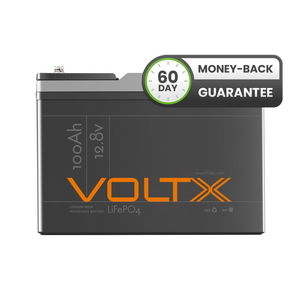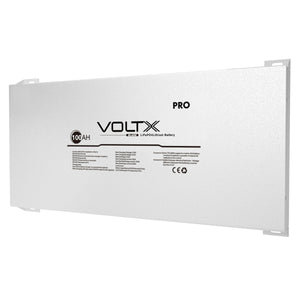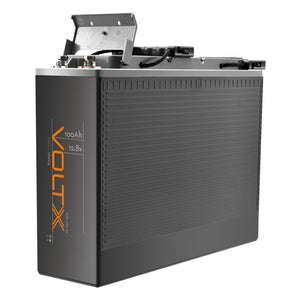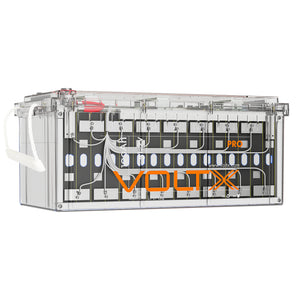Off-grid camping and choosing a good backup battery both require ample, long-lasting capacity. While there are a lot of ways to get this, battery packs are one of the most popular ways. There are tons of camping batteries available in the market but if you want to ensure quality, longevity, and performance, a lot of campers would know that a deep-cycle battery is the best option you can go for. It provides a steady stream of power and discharges only a small percentage 2 to 5%-with every use. This battery can supply reliable energy even at an 80% discharge level, making it perfect for camping in remote locations with no access to mains power.
In terms of capacity, campers usually choose a 100Ah deep cycle battery or 200 amp battery. However, there are also battery capacities in between these, which are perfect if you're going on a short trip only and would just like a bit of extra power in case you need it. These would include 120Ah batteries or if you want something a bit higher, a 130Ah deep-cycle battery. You can choose whether you want to go for a 130Ah AGM deep-cycle battery or a 130Ah lithium deep-cycle battery. AGM batteries are more popular and less expensive, however, if you really want to invest in a camping battery or caravan battery that will last for longer, a 130Ah lithium deep-cycle battery would be the better choice.
What Are the Different Ways of Charging Deep-Cycle Batteries?
Deep-cycle battery charger: This is the most recommended charging method especially if you do it by trickle charging. Charging any battery with its appropriate charger helps prevent battery decline and prolongs your battery's overall lifespan.
Solar charging: In a caravan battery setup, solar panels are mounted on your RV roof and connected to the battery for charging using the energy that comes from the sun. This requires the use of a solar charge controller to avoid overcharging and to regulate the energy from your solar panel that flows into your deep-cycle solar battery. You can either go for an MPPT solar charge controller or PWM regulator but MPPTs are usually better as they are 97% efficient.
Alternators: Charging through your car's alternator usually works for AGM batteries except for gel. Using it on a deep-cycle battery can work, although it will not fully charge your battery. However, this is not advisable as it may lead to sulfation and reduce your battery's lifespan.
Generators: Many newer versions of portable generators have built-in chargers suited for charging batteries. While this is not commonly done unlike solar charging, this has been proven to be reasonably quick and efficient in topping up deep-cycle batteries.
How Do I Know If My Deep Cycle Battery Is Bad?
The common sign of a dead deep-cycle battery is a damaged cell. You can test it when you're charging the battery and the voltage is full but when you start using power, it immediately drops to almost an empty level. This is referred to as an "open-cell," which is usually caused by leaving your batteries in storage for too long. Physically, there are also telltale signs that something is wrong with your deep-cycle battery such as bulges, discolourations, and broken terminals. Make sure to inspect every inch of your battery before using it, do a voltage reading from time to time, and if you have off-grid camping plans, load test your battery first to avoid getting stuck with no power in the middle of camping.
How To Recondition an Old Deep-Cycle Battery?
Haven't used your deep-cycle batteries in a while and feel like they could use a little boost aside from regular maintenance? Try using a battery desulfator. It functions by using pulsed current to remove sulfur from your battery plates and restore them to their original condition. You can also try a battery rejuvenator that sends a high-frequency AC signal through your battery. This signal will then break down the lead sulfate deposits in your battery which reinstates it and allows for more charging/discharging cycles as well. The last method is more of a home remedy called the Battery Rejuvenation Technique. You simply have to boil Epsom salt in water and pour it on the corroded areas of your battery. This is supposed to dissolve lead sulfate deposits and bring back your battery's original state.
More from Outbax
Want to see some great deep-cycle battery reviews? Browse through Outbax and have a look at testimonies from our happy customers. Whether you're buying a 130Ah 12V deep-cycle battery, a 13Ah deep-cycle leisure battery, or even a deep-cycle marine battery, Outbax is the perfect online store for you. We have a wide collection of LiFEPO4 batteries for sale plus other camping gear such as power stations, inverter generators, and solar panels. It doesn't even matter where you are-you could be looking for deep-cycle batteries in Perth or deep-cycle batteries in Adelaide-we'll still have your battery pack delivered to your location.





